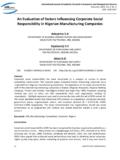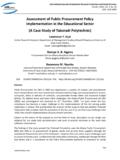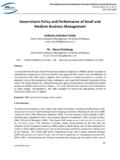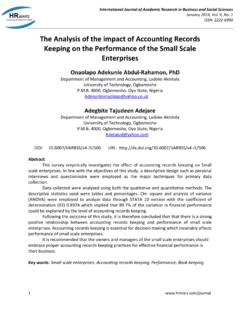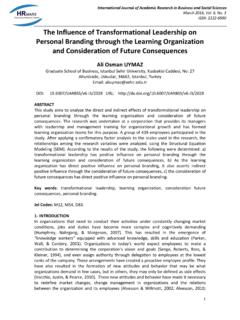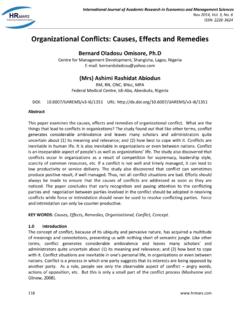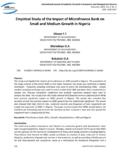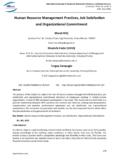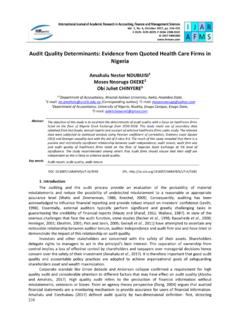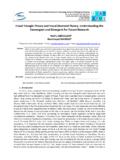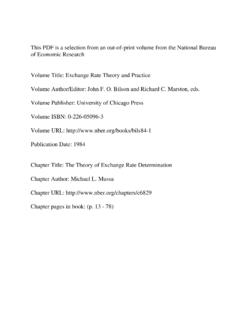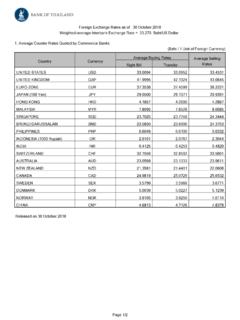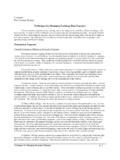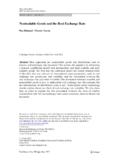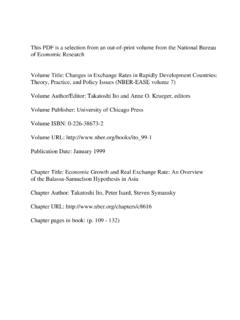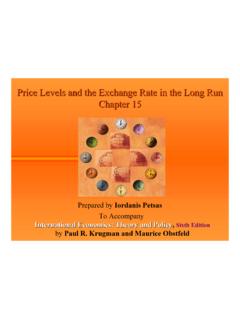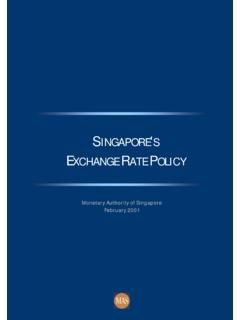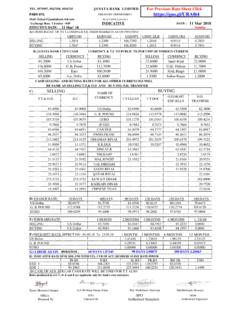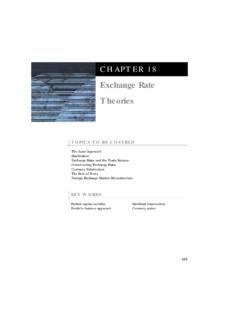Transcription of The Impact of Exchange Rate Fluctuation on the Nigerian ...
1 International Journal of Academic Research in Business and Social Sciences August 2014, Vol. 4, No. 8 ISSN: 2222-6990 224 The Impact of Exchange Rate Fluctuation on the Nigerian Economic Growth: An Empirical Investigation Adeniran, Banking and Finance Department, Osun State Polytechnic, Iree, Nigeria Yusuf, Banking and Finance Department, Osun State Polytechnic, Iree, Nigeria Adeyemi, Olatoke. A Banking and Finance Department, Osun State Polytechnic, Iree, Nigeria DOI: URL: Abstract This research study examined the Impact of Exchange rate on economic growth from 1986 to 2013. The main type of data used in this study is secondary; sourced from Central Bank of Nigeria Statistical Bulletin of various issues.
2 From 1986 being the year the monetary authority shifted from fixed Exchange rate regime to flexible Exchange rate regime to 2013. The correlation and regression analysis of the ordinary least square (OLS) were used to analyze the data. The result revealed that Exchange rate has positive Impact but not significant with ( = , t = , Pns) this is affirms previous studies that developing countries are relatively better off in the choice of flexible Exchange rate regimes. The result also indicated that interest rate and rate of inflation have negative Impact on economic growth but not significant with ( = - , t = - , Pns) and ( = , t = - , Pns) respectively. Therefore, the paper recommended that government should encourage the export promotion strategies in order to maintain a surplus balance of trade and also conducive environment, adequate security, effective fiscal and monetary, as well as infrastructural facilities should be provided so that foreign investors will be attracted to invest in Nigeria Key Words: Exchange Rate, Interest Rate, Inflation Rate, Economic Growth, Liberalization and Nigeria.
3 International Journal of Academic Research in Business and Social Sciences August 2014, Vol. 4, No. 8 ISSN: 2222-6990 225 Introduction Exchange rate is the price of one country s currency expressed in terms of some other currency. It determines the relative prices of domestic and foreign goods, as well as the strength of external sector participation in the international trade. Exchange rate regime and interest rate remain important issues of discourse in the International finance as well as in developing nations, with more economies embracing trade liberalization as a requisite for economic growth (Obansa, Okoroafor, Aluko and Millicent, 2013). In Nigeria, Exchange rate has changed within the time frame from regulated to deregulated regimes.
4 Ewa, (2011) agreed that the Exchange rate of the naira was relatively stable between 1973 and 1979 during the oil boom era and when agricultural products accounted for more than 70% of the nation s gross domestic products (GDP). In 1986 when Federal government adopted Structural Adjustment Policy (SAP) the country moved from a peg regime to a flexible Exchange rate regime where Exchange rate is left completely to be determined by market forces but rather the prevailing system is the managed float whereby monetary authorities intervene periodically in the foreign Exchange market in order to attain some strategic objectives (Mordi, 2006). This inconsistency in policies and lack of continuity in Exchange rate policies aggregated unstable nature of the naira rate (Gbosi, 2005).
5 Benson and Victor, (2012) and Aliyu, (2011) noted that despite various efforts by the government to maintain a stable Exchange rate, the naira has depreciated throughout the 80 s to date. Against this background, this research study intends to investigate the Impact of Exchange rate on economic growth in Nigeria over a period of 28 years (1986 2013). Empirical Review Of Exchange Rate And Economic Growth Exchange rate is the price of one country s currency in relation to another country. It is the required amount of units of a currency that can buy another amount of units of another currency. Aliyu (2011) asserted that appreciation of Exchange rate results in increased imports and reduced export while depreciation would expand export and discourage import.
6 Also, depreciation of Exchange rate tends to cause a shift from foreign goods to domestic goods. Hence, it leads to diversion of income from importing countries to countries exporting through a shift in terms of trade, and this tends to have Impact on the exporting and importing countries economic growth. In the same vein, Hossain (2002) agreed that Exchange rate helps to connect the price systems of two different countries by making it possible for international trade and also effects on the volume of imports and exports, as well as country s balance of payments position. Rogoffs and Reinhartl (2004) also opined that developing countries are relatively better off in the choice of flexible Exchange rate regimes.
7 Previous research on the Impact of Exchange rate on economic growth has reached contrasting results. For instance, Empirical evidence showed that real Exchange rate variations can affect growth outcomes. Edwards and Levy Yeyati (2003) found evidence that countries with more flexible Exchange rate grow faster. Faster economic growth is significantly associated with real Exchange rate depreciation (Hausmann, Pritchett, and Rodrik 2005). Rodrik (2009) International Journal of Academic Research in Business and Social Sciences August 2014, Vol. 4, No. 8 ISSN: 2222-6990 226 argued that real undervaluation promotes economic growth, increases the profitability of the tradable sector, and leads to an expansion of the share of tradable in domestic value added.
8 He claims that the tradable sector in developing countries can be too small because it suffers more than the non-tradable sector from institutional weaknesses and market failures. A real Exchange rate undervaluation works as a second-best policy to compensate for the negative effects of these distortions by enhancing the sector s profitability. Higher profitability promotes investment in the tradable sector, which then expands, and promotes economic growth. Asher (2012) examined the Impact of Exchange rate Fluctuation on the Nigeria economic growth for period of 1980 2010. The result showed that real Exchange rate has a positive effect on the economic growth. In a similar study, Akpan (2008) investigated foreign Exchange market and economic growth in an emerging petroleum based economy from 1970-2003 in Nigeria.
9 He found that positive relationship exists between Exchange rate and economic growth. Obansa, Okoroafor, Aluko and Millicent (2013) also examined the relationship between Exchange rate and economic growth in Nigeria between 1970 2010. The result indicated that Exchange rate has a strong Impact on economic growth. They concluded that Exchange rate liberalization was good to Nigerian economy as it promote economic growth. Azeez, Kolapo and Ajayi (2012) also investigated the effect of Exchange rate volatility on macroeconomic performance in Nigeria from 1986 2010. They discovered that Exchange rate is positive related to Gross Domestic Product. Adebiyi and Dauda (2009) using error correction model argued on the contrary that trade liberalization promoted growth in the Nigerian industrial sector and stabilized the Exchange rate market between 1970 and 2006.
10 To them, there was a positive and significant relationship between index of industrial production and real export. A one per cent rise in real export increases the index of industrial production by per cent. By implication, it means that the policy of deregulation impacted positively on export through Exchange rate depreciation. However, past studies also showed that Exchange rate has no significant effect on economic growth performance. For example, Bosworth, Collins, and Yuchin (1995) provided evidence that in a large sample of industrial and developing countries, real Exchange rate volatility hampers economic growth and reduces productivity growth. Ubok-udom (1999) examined the issues surrounding the implementation of SAP in Nigeria, and drew up a conclusion that the peculiar features of Nigerian economy reduced the efficacy of currency depreciation in producing desirable effects.
